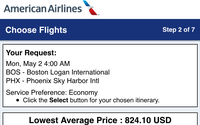Commentary
23 Billion Tickets Moving To Mobile; Airlines Lead The Way
- by Chuck Martin , Staff Writer, April 19, 2016

After an eternity of mobile payment providers creating numerous approaches to using a smartphone to pay, and then with a barrage of consumer-targeted marketing to help persuade consumers to give it a try, the masses still lean to credit or debit cards or the old standby: cash.
Apple finally adopted NFC (near field communication) so most any phone, Android or Apple, could be used to pay without the hassle of app downloads.
Of course, merchants had to install some new equipment so they could take the mobile payments, which many did, especially the larger retailers.
And then Samsung acquired LoopPay, giving them technology that could be embedded in all new phones so that not even new terminals at retailers were necessary.
After all of those efforts, the success in mobile payments still seems to come down to where there are recurring payments. Nothing fancy, just the simple utility of using a phone to pay for something that is purchased more than once.
Starbucks is the poster child of this phenomenon, of course.
However, while the cost of some of the drinks may be considered a bit on the high side in relation to other establishments, they are relatively low compared to where mobile payments are hot.
Airline mobile app ticketing is on the rise, according to a new study. And these tickets are big business.
About 23 billion transport and event tickets will be purchased globally using mobile handsets by 2020, which is more than twice the number purchased this year, according to Juniper Research.
The airline industry leads the way, with airline app ticketing as the most established in terms of deployment and user adoption. Airlines are followed by event ticketing.
Just last year, the airline industry saw the highest growth from the previous year, with a 50% increase in app-based ticketing users.
Anyone following mobile for some time may recall that no early airline apps even allowed ticket purchasing.
And now, mobile is becoming the favored platform among passengers, with bookings made using an app expected to grow 40% this year, according to the airline trade group SITA.
While many consumers are turning to mobile to buy their airline ticket, flight check-in using an app was used by only 8% of passengers, but that usage expected to grow 90% over the next year, according to SITA.
For entertainment, such as movie tickets, and metro/bus transport, the number of mobile tickets far exceeds that of online ticketing, according to Juniper.
For example, Fandango increased its online sales by 70% last year and sold more than 50% of its movie tickets via mobile devices.
Beacons also are starting to play a role in ticketing within gated environments, so a ticket can be validated when a person walks through. Those beacons also can be used to trigger advertising messages along with seat-upgrade options and restaurant vouchers.
While mobile payments may not yet be mainstream in routine aspects of everyday life, they seem to finding their way to the simple act of ticketing.



